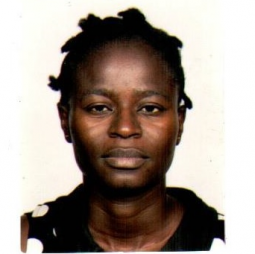Member Profile

Membership type: full
Trust Kasambala
Country of origin: Malawi Currently in: Malawi, Lilongwe General field of specialization: Agricultural Sciences-
Degrees
2018 Doctorate Agricultural Sciences -
Current Research Activities
Agricultural Sciences
My research focus is identification, evaluation and development of non-chemical pesticides (biopesticides) for control of insect pests and plant pathogens. I am using insect pathogenic fungi Beauveria bassiana and Metarhizium anisopliae; and pesticidal plants fish bean (Tephrosia vogelii), mexican sunflower (Tithonia diversifolia) and neem (Azadirachta indica) as biopesticides. For management of insect pests of stored grains, I promote the use of hermetic storage methods such as the use of triple bagging. I am also interested in Pollinator biology
Publications resulting from Research:
1. Ulrike Aspöck, Horst Aspöck, James B. Johnson, Trust Kasambala Donga, Peter Duelli. Rhachiella malawica gen. nov., spec. nov. from Malawi—another beauty of the Afrotropics (Neuroptera: Rhachiberothidae). Zootaxa. DOI: https://doi.org/10.11646/zootaxa.4808.1.7
2. Kelita Phambala, Yolice Tembo, Trust Kasambala, Vernon H. Kabambe, Philip C. Stevenson and Steven R. Belmain. Bioactivity of Common Pesticidal Plants on Fall Armyworm Larvae (Spodoptera frugiperda). Plants 2020, 9(1), 112; https://doi.org/10.3390/plants9010112
3. Trust Kasambala Donga, Richard Meadow, Bishal K. Sitaula, Ole M. Eklo. 2020. Impact of climate variability on the use and exposure of pesticides in sugarcane production in Malawi. In: Climate Impacts on Agricultural and Natural Resource Sustainability in Africa. Bal Ram Singh, Andy Safalaoh, Nyambilila A. Amuri, Lars Olav Eik, Bishal K. Sitaula, Rattan Lal (editors). Pages 159-173., Springer Book Publishers
4. Kasambala Donga, T. and Meadow, R. Determination of Genetic Diversity in Chilo partellus, Busseola fusca, and Spodoptera frugiperda Infesting Sugarcane in Southern Malawi Using DNA Barcodes. Insects 2018, 9, 74; doi:10.3390/insects9030074
5. Kasambala Donga, T. and Eklo, O.M. Environmental load of pesticides used in conventional sugarcane production in Malawi. Crop Protection 2018, 108 (2018) 71–77; doi.org/10.1016/j.cropro.2018.02.012
6. Kasambala Donga, T. Vega, E. and Klingen, I. Establishment of the fungal entomopathogen Beauveria bassiana as an endophyte in sugarcane, Saccharum officinarum. Fungal Ecology 2018, 35 (2018) 70-77; https://doi.org/10.1016/j.funeco.2018.06.008
7. Chancy B. Sibakwe, Trust Kasambala-Donga, Samuel M. C. Njoroge, W. A. B. Msuku, Wezi G. Mhango, Rick L. Brandenburg, and D. L. Jordan. The Role of Drought Stress on Aflatoxin Contamination in Groundnuts (Arachis hypogea L.) and Aspergillus flavus Population in the Soil. Modern Agricultural Science and Technology 2017, 3(5-6), 22-29. doi: 10.15341/mast(2375-9402)/03.03.2017/005
8. Nyirenda G.K.C., Tembo, Y.L.B., Tanganyika, J., Donga, T., Bandason, E., Bakili, O., Saka, V.W., Moyo, B.H.Z. and Mwase, W. (2013). A survey of plants with known pesticidal and medicinal values in Malawi: a case of Mkwinda and Malingunde extension planning areas in Lilongwe. Abstract. Book of Abstracts and Timetable Page 152.The First International Conference on Pesticidal Plants 21 - 24 January 2013, icipe, Kenya.
9. Kasambala, T., Chinwada, P. and Mvumi, B. (2012). Evaluation of the Susceptibility of Maize Hybrid Varieties to Prostephanus truncatus (Bostrichidae: Coleoptera) in Malawi. A paper presented at National Commission for Science and Technology Conference. Crossroads Hotel, Lilongwe, Malawi
10. Kasambala, T. and Chinwada, P. (2011). Modelling the occurrence of Prostephanus truncatus (Coleoptera: Bostrichidae) in Southern Malawi. Journal of Stored Products and Postharvest Research, 4(2):72-78
11. Trust Kasambala Donga, (2016). Helping farmers to better manage climate related risks to Post-harvest Handling in Malawi. FANRPAN Policy Brief, 08/2016.
Current profession
Current professional activities type:ResearchTeachingI am currently teaching general and applied entomology at both undergraduate and postgraduate levels. I also conduct research on entomology and crop protection issues.
Presentation given
2018Impact of climate variability on the use and exposure of pesticides in sugarcane production in MalawiBingu International Conference Centre, Lilongwe, MalawiEvent: 2018 LUANAR AND CABMACC RESEARCH DISSEMINATION CONFERENCE -
Other Awards
Jun 2019One Planet 2019 Candidate LaureateAnnounced at the One Planet Summit held in Paris in December 2017, the One Planet Fellowship will work to build the capacity of high-potential researchers from Africa and Europe to develop relevant, gender responsive interventions towards climate change adaptation. It is designed to build and enhance the mentoring, scientific, networking and leadership skills of scientists working on the nexus between agriculture and climate change adaptation and mitigation. African Women in Agricultural Research and Development (AWARD) will lead the management of the Fellowship in partnership with Agropolis Fondation.Dec 2019Harnessing pollinator bioinformatics in Malawi through understanding of agroecological interventionsThe project will be implemented in 36 months and will work to develop a database and portal that will enhance access of pollinator biodiversity information. Information collected through this program will enable policy makers and others to understand the significance of pollinator diversity, and hence promote effective conservation action.Jul 2021Fulbright African Research Scholar AwardThe Fulbright African Research Scholar Award is an awards of 3 to 9 months are offered for selected university faculty professionals to conduct research in any academic discipline at a U.S. academic or research institution. Preference is given to individuals with a doctorate degree, at least three years of university teaching experience, a productive scholarly record, and whose projects relate directly to their ongoing teaching and/or research responsibilities. I was at Purdue university department of entomology from July to November 2021. I was hosted by Prof Dieudonne Baributsa in the posthatvest innovation lab






